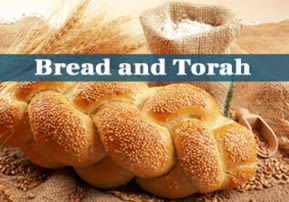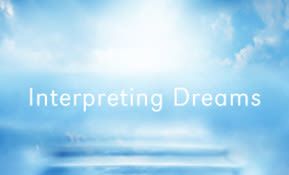
Ekev: Bread and Torah
Most blessings are of rabbinical origin. There are, however, two exceptions to this rule — blessings that are derived directly from the Torah itself…

translated by Rabbi Chanan Morrison
Parshat Ekev
Blessing over Torah Study
The obligation to recite a blessing over food is explicitly stated in the Torah:
"When you eat and are satisfied, you must bless the Lord your God for the good land that He has given you." (Deut. 8:10)
But what is the source for reciting a blessing before studying Torah? According to Rabbi Ishmael, this is derived "a fortiori". "If one makes a blessing for that which sustains life in this transient world, certainly one should make a blessing for that which gives eternal life in the World to Come!" (Berachot 48b)
Why is the blessing over Torah study based on the blessing over food? Why is there no explicit source for this blessing?
Appreciating the Torah
Rav Kook explained that the human mind is unable to truly grasp the greatness of the Torah, an immeasurable gift from God. We best relate to and appreciate the material objects of our finite world. We will only be able to properly appreciate the Torah's true value in the future.
One may recognize the Torah's importance on an intellectual level, but this is beyond our emotional faculties. Yet, it is possible for us to deepen our emotional appreciation for the Torah by contemplating the association that Rabbi Ishmael made between Torah and physical sustenance. If we are filled with strong feelings of gratitude for fleeting benefits in this world, all the more we should be thankful for that which gives life in the eternal World to Come.
This contemplative exercise is one way we may spiritually elevate our temporal pleasures. Rav Kook concluded his remarks by cryptically quoting 16th century Kabbalist Rabbi Yitzhak Luria (the Ari) of Safed, that the soul is nourished from the internal essence of food, as the verse states:
"Not by bread alone will man live, but rather by all that comes from God". (Deut. 8:3) This implies that the human soul also lives by bread.
Two Blessings from the Torah
 Most blessings are of rabbinical origin. There are, however, two exceptions to this rule — blessings that are derived directly from the Torah itself. The first is Birkat Hamazon, recited after meals; the second is the blessing said before learning Torah.
Most blessings are of rabbinical origin. There are, however, two exceptions to this rule — blessings that are derived directly from the Torah itself. The first is Birkat Hamazon, recited after meals; the second is the blessing said before learning Torah. The obligation to bless God after eating bread is stated explicitly: "When you eat and are satisfied, you must bless the Lord your God…" (Deut. 8:10).
The Sages derived the blessing before studying Torah from the verse, "When I proclaim God's name [or: when I read God's teaching], praise our God for His greatness" (Deut. 32:3).
These two blessings differ not only in the source for our feelings of gratitude — one is for physical nourishment, the other for spiritual sustenance — but also in when they are said. Why is Birkat Hamazon recited after the meal, while the blessing for Torah study is recited before studying?
Two Benefits of Food
We derive two benefits from food. The first is our enjoyment from the act of eating, especially if the food is tasty. This is a fleeting pleasure, but it nonetheless deserves to be acknowledged. The primary benefit from eating, however, is the sustenance it gives our bodies, enabling us to continue living. This primary benefit reflects the nutritional value of the food, regardless of its taste.
Our recognition of the principal benefit of eating should take place after the meal, when the body digests and absorbs the food. Since Birkat Hamazon expresses our gratitude for physical sustenance, its logical place is at the end of the meal.
Parenthetically, there are also blessings that are reciting before eating. These blessings are in recognition of our pleasure in the act of eating itself. We acknowledge this secondary benefit of eating with rabbinically-ordained blessings.
Two Benefits of Torah Study
Torah study also provides us with two benefits. The first is the knowledge acquired in practical areas of Halachah, enabling us to live our lives according to the Torah's wisdom.
The second benefit lies in the very act of learning Torah. Torah study in itself is a tremendous gift, even if it does not provide any practical applications. When we learn Torah, the soul is elevated as our minds absorb the sublime word of God.
Which benefit is greater? The Sages taught that the unique sanctity of the Torah itself is higher than all deeds that come from its study: "One who studies Torah for its own sake is raised and uplifted above all actions" (Avot 6:1). The benefit of practical knowledge is important, but is only a secondary gain.
Therefore, we recite the blessing over Torah before studying. If the blessing was meant to acknowledge the practical benefit of how to perform mitzvot, then it would be said afterwards, since this Halachic knowledge is gained as a result of Torah study. But the blessing over Torah refers to the principle gift of Torah study. When we bless God before studying, we acknowledge the spiritual elevation that we enjoy in the very act of contemplating God's Torah.
Now we can understand why the source in the Torah for this blessing reads, "When I proclaim God's name." Why does the verse refer to the Torah as "God's name"? This blessing requires that we recognize the sublime inner essence of the Torah as "God's name." With awareness of this truth, Torah study can enlighten and uplift us "above all actions."
(Gold from the Land of Israel, pp. 307-309; adapted from Ein Eyah vol. I, p. 103 (on Berachot 20).)
* * *
Rabbi Chanan Morrison of Mitzpeh Yericho runs http://ravkookTorah.org, a website dedicated to presenting the Torah commentary of Rabbi Avraham Yitzchak HaCohen Kook, first Chief Rabbi of Eretz Yisrael, to the English-speaking community. He is also the author of Gold from the Land of Israel (Urim Publications, 2006).










Tell us what you think!
Thank you for your comment!
It will be published after approval by the Editor.